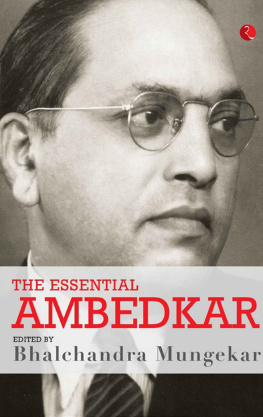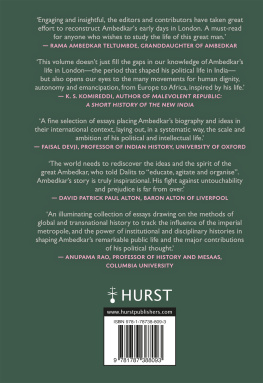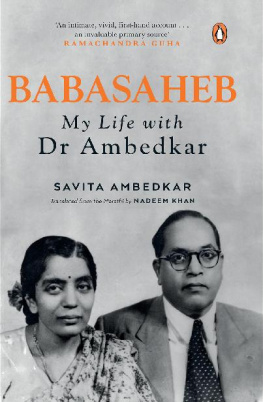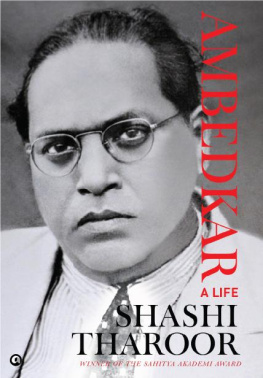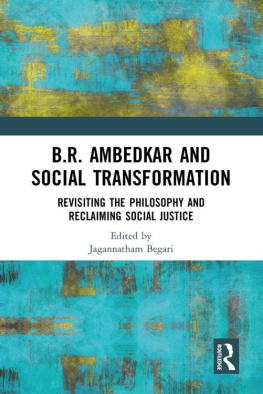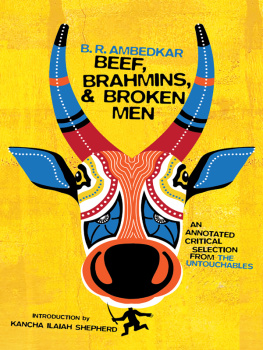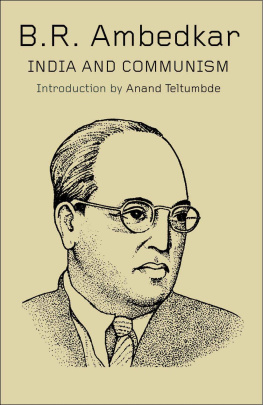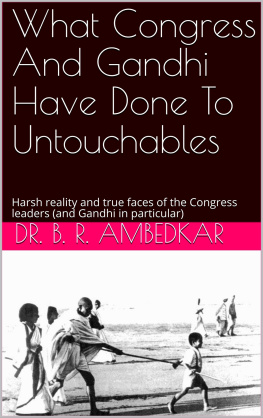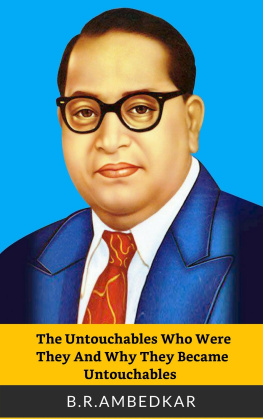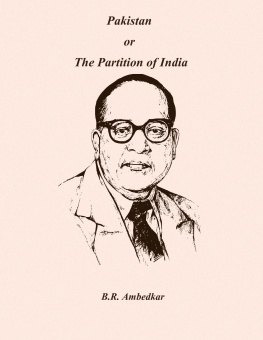Bhalchandra Mungekar - The Essential Ambedkar
Here you can read online Bhalchandra Mungekar - The Essential Ambedkar full text of the book (entire story) in english for free. Download pdf and epub, get meaning, cover and reviews about this ebook. year: 2015, publisher: Rupa Publications, genre: Science. Description of the work, (preface) as well as reviews are available. Best literature library LitArk.com created for fans of good reading and offers a wide selection of genres:
Romance novel
Science fiction
Adventure
Detective
Science
History
Home and family
Prose
Art
Politics
Computer
Non-fiction
Religion
Business
Children
Humor
Choose a favorite category and find really read worthwhile books. Enjoy immersion in the world of imagination, feel the emotions of the characters or learn something new for yourself, make an fascinating discovery.
- Book:The Essential Ambedkar
- Author:
- Publisher:Rupa Publications
- Genre:
- Year:2015
- Rating:4 / 5
- Favourites:Add to favourites
- Your mark:
- 80
- 1
- 2
- 3
- 4
- 5
The Essential Ambedkar: summary, description and annotation
We offer to read an annotation, description, summary or preface (depends on what the author of the book "The Essential Ambedkar" wrote himself). If you haven't found the necessary information about the book — write in the comments, we will try to find it.
The Essential Ambedkar — read online for free the complete book (whole text) full work
Below is the text of the book, divided by pages. System saving the place of the last page read, allows you to conveniently read the book "The Essential Ambedkar" online for free, without having to search again every time where you left off. Put a bookmark, and you can go to the page where you finished reading at any time.
Font size:
Interval:
Bookmark:
THE ESSENTIAL
AMBEDKAR
THE ESSENTIAL
AMBEDKAR
EDITED BY
Bhalchandra Mungekar

Published by
Rupa Publications India Pvt. Ltd 2017
7/16, Ansari Road, Daryaganj
New Delhi 110002
Selection and Introduction Copyright Bhalchandra Mungekar 2017
Passages quoted on pp. 111112, 118120, 123124 and 177178 from Dr. Bhimrao Ramji Ambedkar by Changdeo Bhagwanrao Khairmode are reprinted by permission of Sugava Prakashan Ltd.
Grateful acknowledgement is made to the Government of Maharashtra for permission to reprint copyright material from Babasaheb Ambedkar: Writings and Speeches , Vols. 117.
All rights reserved.
No part of this publication may be reproduced, transmitted, or stored in a retrieval system, in any form or by any means, electronic, mechanical, photocopying, recording or otherwise, without the prior permission of the publisher.
The views and opinions expressed in this book are the authors own and the facts are as reported by him/her which have been verified to the extent possible, and the publishers are not in any way liable for the same.
ISBN: 978-81-291-3507-0
First impression 2017
The moral right of the author has been asserted.
Typeset by SRYA, New Delhi
This book is sold subject to the condition that it shall not, by way of trade or otherwise, be lent, resold, hired out, or otherwise circulated, without the publishers prior consent, in any form of binding or cover other than that in which it is published.
To Babasaheb
Since the dawn of the Industrial Revolution, the tempo of the world has been accelerating forward at a breathtaking speed. However, in India, an indigenously created caste-based segregation, our version of racism, a minute and comprehensive form of discrimination and oppression that has existed for millennia, has been at work with the same speed, but unfortunately in the opposite direction. For the section classified as the Depressed Classes, day-to-day life is in itself a grave struggle, a manifold fight for survival.
In every modern, democratic nation, people want to feel fully alive rather than merely survive. In order to for them to do so, the polity is required to imbibe a sense of socio-economic and political equality, as well as liberty. However, in India, this is not, and has never been, the case, and there is no way to know how long, in the ongoing civilizational process, this human greed for adoring and enjoying certain privileges over others is going to last. But as long as inequality and discrimination exist, a struggle to get rid of this yoke by the deprived masses will certainly continue to be part of the socio-political fight for generations to come.
The nature of the struggle by the sieged population fighting to annihilate these caste fortifications has always been defensive rather than offensive. The credit for this civility goes to Dr Bhimrao Ramji Ambedkar, one of the tallest, yet most neglected and often misunderstood intellectual-political leaders in the mainstream socio-political discourse of modern India. Perhaps because he fundamentally challenges the iniquitous Hindu social order, he has been rendered the most controversial of the mass political leaders in India. However, the fact remains that his key text, The Annihilation of Caste , contains persuasive arguments, heavily supported with solid facts, as well as a sophisticated, logical tone. This seminal book on the one hand depicts a rebellion against caste and untouchability and wants to destroy it; and on the other, it advocates non-enmity with coercion towards the tormentor, implicitly advising that there are always other practices available to push forward a struggle for justice responsibly rather than indulging in punitive violent measures. So the epoch-making approach Ambedkar adopts, though corrective and hence confrontational, is both a peacemaking as well as peacekeeping one.
Ambedkar was the pioneer intellectual in the study of caste and untouchability. He delved into such details that with all their possible and conceivable dimensions, he fought caste discrimination at all given levels: social, political, economic and educational. His Annihilation of Caste is both an illuminative as well as a redemptive text. Ambedkar used his writings and lectures to confront a world of indifference and betrayal in order to pursue his reformative agenda, equal in dimension to that of Gandhis. The power of his reason was such that Gandhi described him as a challenge to Hinduism. But unfortunately he did not receive the attention, the critical acclaim, or the adulation he deserves, the way Gandhi did. Ambedkar was of the view that political safeguards for Untouchables were necessary as the Untouchables constituted the largest minority, and that without these safeguards they would not be able to enjoy political and social freedom. This was viewed as a direct challenge to Gandhis unchallenged leadership and therefore the conflict between the two was inevitable.
Being a multifaceted personalityan economist, a sociologist, a barrister, an editor, a constitutionalist of the first rank, a professor, an able parliamentarian, an educationist and a commentator on BuddhismAmbedkar was predestined to engage himself beyond personality conflicts and look into the problems of India from both a macro as well as micro perspective.
Ambedkars views and efforts towards the abolition of caste and untouchability necessarily differed from those of his predecessors because he was born an Untouchable himself, who had suffered indignities and humiliations while growing up and also in his preliminary professional career.
His struggle was meant to raise a whole community, which until then had been condemned to endure abandonment, betrayal and social invisibility resulting in imposed poverty, though by virtue of their resolve they had always managed to survive even under such inhuman circumstances. His writings became the manifesto of social emancipation for the supressed masses. Throughout his argumentative and active life he had always dreamt of a casteless, democratic and fraternal Indian society which would be prosperous enough to be responsible for their individual as well as social well-being.
Ambedkars basic arguments were against the institutionalization of the caste-based isolation and discrimination prevalent in the Hindu mind. Regretfully, in the course of time, this evil mindset had conquered many of the other religious communities in India. Hence, in view of the Hindus unwillingness to lay aside the yoke of casteism, he felt compelled to find kinship in Buddhism, a religion free from the inhuman practice of segregation.
His intellectual integrity, showing his uncompromising commitment to his cause, was so strong that when he was asked to remove parts of his planned lecture in Lahore on The Annihilation of Caste, he promptly wrote back: I shall not change even a comma in the text of the lecture. As a result, the organizers cancelled the lecture and it remained undelivered. Ambedkar thereafter published it in a personal capacity.
Besides being a social revolutionary, Ambedkar was a devoted patriot and a great nation builder. For all the disappointment he suffered thanks to the Indian socio-political system, he remains one of the greatest thinkers of renewal worldwide. He dealt with all the burning problems facing the country and provided lasting solutions. Not a single issue that related to India remained untouched by him. As an active intellectual politician, whose carefully evolved ideas are still valid today, Ambedkar had prominently participated in the making of the Indian Constitution as its chief architect. The prime aim and mission of his life was the abolition of caste discrimination from the fabric of India. He wanted to bring the downtrodden and oppressed people freedom from caste-based oppression and untouchability. To this end he challenged the system and fought for structural reforms in the way Indian polity and society was organized.
Next pageFont size:
Interval:
Bookmark:
Similar books «The Essential Ambedkar»
Look at similar books to The Essential Ambedkar. We have selected literature similar in name and meaning in the hope of providing readers with more options to find new, interesting, not yet read works.
Discussion, reviews of the book The Essential Ambedkar and just readers' own opinions. Leave your comments, write what you think about the work, its meaning or the main characters. Specify what exactly you liked and what you didn't like, and why you think so.

